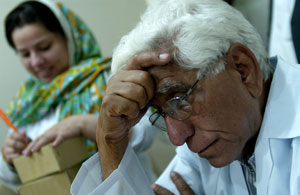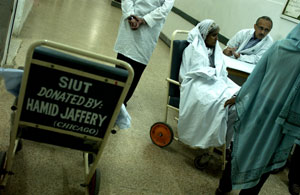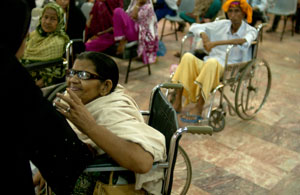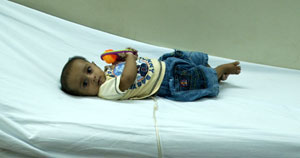Gift of Life: SIUT’s Organ Donation Drive
By Hamna Zubair | Society | Published 13 years ago
Fourteen-year-old Akash Rai is having a celebrity moment. He’s having his picture taken as a throng of admirers look on. But hold on — he isn’t an athlete, a movie star or a chess prodigy; this bespectacled adolescent is simply the youngest person to have pledged to donate his organs during the Sindh Institute of Urology and Transplantation’s (SIUT) organ donation drive.
Akash is one of many people who dropped by SIUT’s Deceased Organ Donation Exhibition during its two-week run. The exhibition was an attempt to spread awareness about the acute need for human organs in Pakistan. Those who attended were greeted by doctors who ushered them through a hall plastered with posters and installations explaining why one should volunteer to contribute his or her organs after death.
At the end of their tour, attendees were asked whether they would like to sign a form indicating their willingness to donate their organs after death. Each signature represented a new beginning for some patient languishing in hospital waiting for a transplant.
Unfazed by the attention, Akash insists his decision to sign up is driven by rationality and not by a desire to impress his father, who is a physician. “It makes sense. After you die, your body’s pretty useless. All you’ll be doing is rotting in the ground. Isn’t it better to let someone use your organs to get another chance at life?”
Plainly put perhaps, but this is the general principle that motivates people to sign up for deceased organ donation. Despite the logic of the aforementioned argument, however, the mini-celebrations that welcome new pledges into the fold are few and far apart at SIUT: only a little over 130 people had signed on as organ donors as the exhibition drew to a close.
And therein lies the problem.

Photo: Courtesy Arif Mahmood
“Pakistan’s need for organs outstrips supply by miles,” says SIUT founder Dr Adeebul Hasan Rizvi. Instantly recognisable by his shock of white hair, Dr Rizvi is constantly approached by colleagues and staff during our chat, demonstrating just how involved he remains with SIUT’s daily business. For him, the deceased donor programme represents years of work slowly coming to fruition. When Dr Rizvi set up SIUT decades ago as an eight-bed facility in Karachi’s Civil Hospital he had only one aim: to provide free healthcare to those in need. At the present moment, SIUT occupies two buildings and has opened satellite centres across the country. “We administer dialysis to 650 people every 24 hours in Karachi alone,” says Dr Rizvi. “But this isn’t enough.”
According to Dr Rizvi, Pakistanis require 25,000 kidneys, 8,000 hearts and 12,000 livers annually. Over 50,000 Pakistanis die every year due to end-stage organ failure, but Dr Rizvi stresses that this number could be reduced drastically if more organs were available for transplantation. As he puts it: “An organ transplant is the ultimate solution.”
Unfortunately, organ donation and transplantation in Pakistan has been plagued by complications and controversies. Poor access to healthcare professionals, very little awareness about organ donation and misgivings about organ transplants fuelled by religious concerns mean that few people are aware that fatal health problems can be resolved through transplants. Add to this the fact that virtually no legislation regulating organ transplants existed in Pakistan until 2010, and you have a more complete picture of why Pakistan lags far behind other countries in terms of transplant awareness.
“Though it came late, getting the Transplantation of Human Organs and Tissues Bill signed into law in 2010 was a big step forward for the medical community,” says Dr Anwar Naqvi, Professor of Urology at SIUT. “Pakistan used to be a thriving organ bazaar where the poor man was terribly exploited. Organs could be sold to wealthy foreigners for anywhere between USD 20,000 to USD 50,000 and the poor Pakistani at the other end of the deal would see only Rs 70,000 or so. There was no post-operative care provided to the donor. It was just abuse.” According to Dr Naqvi’s estimates, at least 2,000 organs were bought and sold annually before 2010. “Outlawing the buying and selling of organs has definitely made a huge dent in this market,” he maintains.

Photo: Courtesy Arif Mahmood
In Dr Naqvi’s view, the recently passed law has had another positive impact on organ donation and transplants — it has allayed some of the people’s reservations about the religious implications of donation. Since objections to the bill were dismissed by the Federal Shariat Court in 2008 and the law was unanimously passed by both houses of Parliament, religious opposition to organ donation has lost most of its ground and died down. Moreover, doctors at SIUT are quick to stress that an increasing number of Muslim countries, Saudi Arabia, Iran, Kuwait, Lebanon and Turkey among them, encourage and support organ donation and transplants.
These strides are admirable, but a few important issues remain unresolved, such as the low availability of organs in Pakistan and the lack of enthusiasm about organ donation.
Currently, if a patient needs a kidney transplant, SIUT relies on organs donated by family members. A case in point is Saira, a 17-year-old from Khairpur who had a kidney transplant three months ago. She has travelled to Karachi now for a scheduled check-up, and to stock up on medication to prevent tissue rejection, medication that she will have to take for the rest of her life.“I have two brothers, elder and younger,” says the simply dressed teenager. “When my kidneys failed they both volunteered to donate their own for my sake. Both my brothers were a match but I ended up taking my elder brother’s kidney because he felt more responsible towards me.” Saira was lucky because her family could provide her with a kidney. But, as Dr Naqvi points out, some patients do not find a donor match in their own families and some patients need more than one transplant since it is possible that a body may reject the first donation. What is one to do then?

Photo: Courtesy Arif Mahmood
The only way out is to rely on organs collected through deceased organ donation. Saira is initially reluctant to consider the possibility of accepting an organ from a stranger. “I would prefer to take an organ from one of my family members,” she says, but ultimately concedes that if there was no other option, she’d accept a donation from anyone.
This confusion and fear surrounding deceased organ donation is not restricted to recipients. At the exhibition, doctors talking to potential donars field dozens of anxious questions. One young man is particularly worried about how ‘brain death’ will be diagnosed, and whether organ donation will disfigure the body after death.
Dr Abbas Ali, who is on hand to explain the intricacies of deceased organ donation, stresses that people who sign up to pledge their organs have very little to worry about. “First of all, signing up to be a donor simply signifies your intention to donate, it does not guarantee that you will be an organ donor after death,” he says. Further, he explains that only a fraction of people who pass away do so in an environment that will allow their organs to be usable after death. Since organs deteriorate quickly if they are not supplied with blood and oxygen, people who pass away at home without access to a ventilator and other life-saving equipment are automatically excluded from the donor pool.
To people concerned about whether they will be correctly diagnosed in case of brain death, he says that a group of specialists who have no connection with the transplant team will perform several checks over a period of time to ascertain brain death. If organs need to be harvested, the body is sewn back up after surgery according to normal practice, and handled with the utmost respect.

Photo: Courtesy Arif Mahmood
Still, reservations prevail. The numbers do the talking best: according to Dr Naqvi only about 30 people have been recipients of organs from deceased donors. The doctor himself is incredulous. “Only about 30 people benefitting from deceased donations in Pakistan’s history… it’s a ridiculously low number,” he says. In fact, of these 30 organs more than a few were supplied by Eurotransplant donations, and so did not originate from Pakistan anyway.
Pointing to five prominently displayed posters on a wall in the exhibition space, he proclaims that more individuals need to follow the example set by these brave souls. On closer inspection, I find these posters bear the photographs of deceased organ donors. One of them is of a young man called Imran Shah, whose story Dr Naqvi remembers vividly. “He was in a traffic accident and was admitted to a private hospital in Islamabad only to be declared brain dead. We needed a kidney in Karachi at the time and I believe he had expressed a wish to donate his organs during his lifetime. He saved a life.”
Professor Razzak Memon, Naveed, Shamim and Arsalan are the other four deceased donors that SIUT celebrates. Naveed, a student at Karachi University, was heading home on his motorcycle when he suffered a deadly traffic accident. He was diagnosed brain dead at a hospital not long after, and his story would have ended there had his family not approached doctors with an unusual admission: during his lifetime, Naveed had indicated a desire to donate his organs to a person in need. Could his request be honoured?
The answer was a resounding ‘yes.’ Naveed passed away before the 2010 bill regulating transplants was passed, so lawyers had to be consulted to ensure transparency. In the end, the Naveed and his family’s will was upheld and his kidneys and corneas helped give someone else a chance at life.
The common thread running through each deceased donor’s story is this: at some point in their lives, Imran, Naveed, Shamim, Arsalan and Dr Razzak Memon had expressed a desire to donate their organs. This knowledge enabled friends and family to come forward and honour their wishes. “We always tell people to discuss their thoughts about donation with family,” says Dr Abbas Ali. “It’s a difficult decision, but in our experience families stand by the donor’s will.
Photo: Courtesy Arif Mahmood
According to Dr Rizvi, his team kept a systematic plan in mind to help people get greater access to organs and organ transplants. “We knew the first step towards progress was to get the law passed, and we did that. The second was to get religious parties on our side, and we did that. Now, we have to get people on board. That is work in progess.”
Indeed, when Pakistan’s track record of deceased organ donations is compared to supply elsewhere in the world, the ground to cover seems daunting. “Worldwide, about 80% of the need for organs is met by deceased donors. But in Pakistan I would say all our transplant needs are met by live donations, which has its limitations.” says Dr Rizvi. “So we have a long way to go.”
In an administrative office away from the main ward’s hustle and bustle, Dr Mirza Naqi Zafar of the Transplant Society of Pakistan ventures that Pakistan’s poor progress on encouraging deceased organ donation is further hampered by the health sector’s disorganised state.”It’s obvious health isn’t a priority,” says Dr Zafar. “Forget launching new campaigns, even bodies that have been created two years ago are totally non-functional.” Dr Zafar is specifically referring to the Human Organ Transplant Authority (HOTA), a regulatory body that was set up under the auspices of the 2010 transplant bill.” HOTA was created as a federal body but after health went to the provinces following the 18th Amendment, no one knew what to do with it. Eventually provincial HOTAs were created but they exist only in name, and in any case this body has no powers of implementation.”
Among other responsibilities, the authority is supposed to be informed of and keep records for every transplant that takes place in Pakistan. The authority is also meant to ensure that illegal trade in organs is kept in check.
All the doctors involved with SIUT’s transplant operations agree on one point: there is a great need for people to be educated about deceased organ donation. The next step for SIUT will be to take this drive to the public, physically running their campaign in schools and universities to start with. “Most of the people who have pledged their organs so far are students, young professionals and members of the medical community,” says Dr Abbas Ali. Looking at the demographic, it’s clear that people with greater knowledge about organ donation are more likely to pledge their organs, so increasing awareness is a must.
SIUT uses every resource at its disposal to do this, including getting celebrities to sign on. By the drive’s second-last day Dr Fehmida Mirza, Zubeida Mustafa, Abdul Sattar Edhi, Ardeshir Cowasjee and many other prominent members of civil society had pledged their organs.
And if local celebrities don’t motivate people enough, there is a foreigner on hand to do the job. Riaz, a videographer in his thirties, decided to sign up for the programme after looking at a poster of Lady Diana displayed in the exhibition space. The poster claims that Diana’s organs saved eight lives, which gives Riaz the push he needs. “They tell me I can save a life after my death,” says Riaz. “What could be better than that?”
This article was originally published in the May issue under the headline “Gift of Life.”


